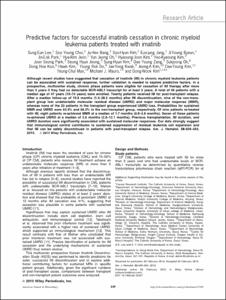KUMEL Repository
1. Journal Papers (연구논문)
1. School of Medicine (의과대학)
Dept. of Internal Medicine (내과학)
Predictive factors for successful imatinib cessation in chronic myeloid leukemia patients treated with imatinib
- Keimyung Author(s)
- Do, Young Rok
- Department
- Dept. of Internal Medicine (내과학)
- Journal Title
- American Journal of Hematology
- Issued Date
- 2013
- Volume
- 88
- Issue
- 6
- Abstract
- Although recent studies have suggested that cessation of imatinib (IM) in chronic myeloid leukemia patients
can be associated with sustained response, further validation is needed to explore predictive factors. In a
prospective, multicenter study, chronic phase patients were eligible for cessation of IM therapy after more
than 3 years if they had no detectable BCR-ABL1 transcript for at least 2 years. A total of 48 patients with a
median age of 47 years (19–74 years) were enrolled. Twenty patients received IM for post-transplant relapse.
After a median follow-up of 15.8 months (1.4–28.2 months) after IM discontinuation, nine of the non-trans-
plant group lost undetectable molecular residual disease (UMRD) and major molecular response (MMR),
whereas none of the 20 patients in the transplant group experienced UMRD loss. Probabilities for sustained
MMR and UMRD were 64.4% and 66.3% in the non-transplant group, respectively. Of nine patients re-treated
with IM, eight patients re-achieved MMR at a median of 1.7 months (0.9–2.8 months). Seven of these patients
re-achieved UMRD at a median of 5.6 months (2.8–12.1 months). Previous transplantation, IM duration, and
UMRD duration were significantly associated with sustained molecular responses. Our data strongly suggest
that immunological control contributes to sustained suppression of residual leukemia cell expansion and
that IM can be safely discontinued in patients with post-transplant relapse. Am. J. Hematol. 88:449–454,
2013.
V
C
2013 Wiley Periodicals, Inc.
- Keimyung Author(s)(Kor)
- 도영록
- Publisher
- School of Medicine
- Citation
- Sung-Eun Lee et al. (2013). Predictive factors for successful imatinib cessation in chronic myeloid leukemia patients treated with imatinib. American Journal of Hematology, 88(6), 449–454. doi: 10.1002/ajh.23427
- Type
- Article
- ISSN
- 0361-8609
- Appears in Collections:
- 1. School of Medicine (의과대학) > Dept. of Internal Medicine (내과학)
- 파일 목록
-
-
Download
 oak-aaa-00143.pdf
기타 데이터 / 597.56 kB / Adobe PDF
oak-aaa-00143.pdf
기타 데이터 / 597.56 kB / Adobe PDF
-
Items in Repository are protected by copyright, with all rights reserved, unless otherwise indicated.